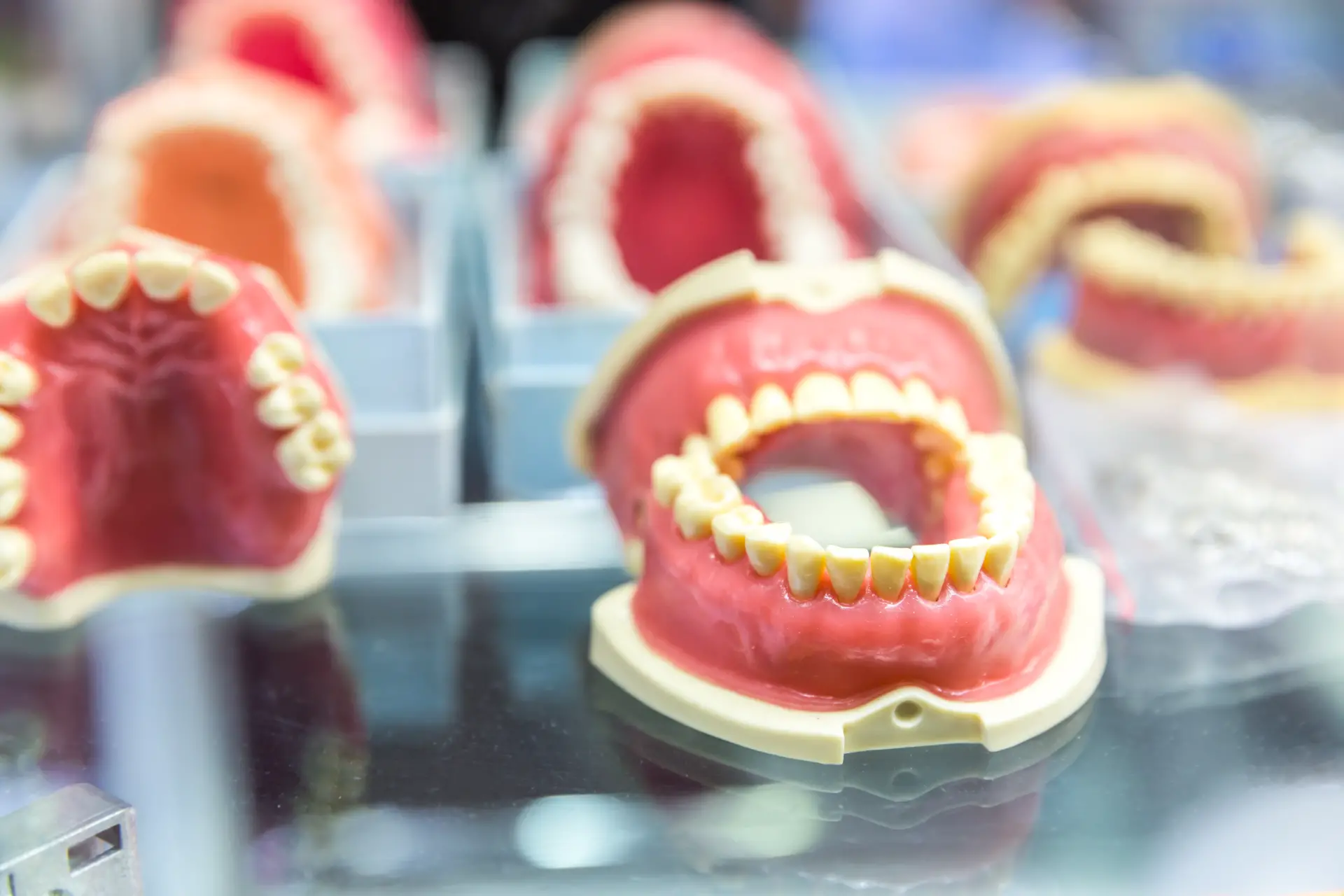Tooth loss, whether from decay, disease, or the natural course of aging, is an experience many of us will face. Beyond a cosmetic concern, missing teeth can hinder your ability to enjoy the foods you love, speak with confidence, and even smile without hesitation. It’s a common issue, yet one that can leave us feeling isolated. Dentures offer a practical, proven solution. These carefully crafted prosthetic devices are designed to replace missing teeth and restore vital functions for your mouth. While dentures are widely known, misconceptions and anxieties around them persist.
So, what exactly are dentures? In a nutshell, they’re removable appliances that replace missing teeth
In this blog, we’ll shed light on dentures, clarify the process, and explore the reasons they might be the ideal solution to reclaim your smile.
Key Takeaways
- Dentures are removable prosthetic devices that replace missing teeth. They improve your ability to eat, speak, and maintain a confident smile.
- Tooth loss occurs for various reasons. The most common include severe decay, gum disease, injury, and age-related wear.
- Dentures come in several types. Options include partial dentures (replacing a few teeth), complete dentures (replacing an entire arch), and implant-supported dentures (attached to posts in the jawbone).
- The process of getting dentures involves several steps. Your dentist will take measurements, create models, and ensure the final dentures fit comfortably and securely.
- Proper care is essential for denture longevity. Daily cleaning, overnight soaking, and regular dental checkups will ensure your dentures remain in good condition.
What Are Dentures?
Dentures are a type of removable dental appliance with artificial teeth attached to a plastic and wire frame. The frame slips over your gums so that the artificial teeth look like natural teeth.
Dentures are a more affordable solution than dental implants if you have many missing teeth. Your dentures will be custom-made in a dental lab to achieve an ideal fit.
Your dentist will also help to make sure that the color of the artificial teeth is as natural as possible so that no one will notice you are wearing dentures.
Types of Dentures
There are many different types of dentures. The option that’s right for you depends on your unique oral health needs.
- Partial dentures can be used to replace one or more teeth. They fill in the spaces left by missing teeth and are supported by clasps that wrap around your remaining natural teeth.
- Complete dentures, also called full dentures, replace an entire arch of missing teeth. They rest on top of your gums and rely on suction to stay in place.
- Implant-supported dentures attach to dental implants placed in your jawbone. This provides a more secure and stable fit compared to traditional dentures.
- Immediate dentures are placed right after tooth extractions, so you don’t have to go without teeth during the healing process. They may need adjustments as your gums heal and change shape.
- Conventional dentures are made and placed after your gums have fully healed from extractions, usually several months later. They tend to fit better than immediate dentures.
Materials Used in Dentures
Modern dentures are usually composed of a combination of acrylic resin and metal. The artificial teeth are made of acrylic, porcelain, or composite material.
The denture base, which resembles gum tissue, is typically made of acrylic resin. Some dentures have a metal framework for added strength and durability.
Why Do People Need Dentures?
Tooth loss isn’t just an issue faced in later years – a variety of factors can lead to missing teeth at any age. Here are the most common reasons why someone might consider dentures:
- Extensive tooth decay: Severe cavities or infections can compromise tooth structure beyond repair, leaving extraction and replacement as the best option.
- Gum disease: In its advanced stages (periodontitis), gum disease destroys the bones and tissues that anchor teeth, eventually leading to tooth loss.
- Trauma or injury: Unexpected accidents, whether on the sports field or in daily life, can result in fractured or knocked-out teeth.
- Age-related tooth wear: A lifetime of use gradually wears down teeth, and sometimes, the wear is so severe that the tooth can no longer function properly.
- Medical Conditions: Certain medical conditions or treatments can increase the risk of tooth decay or gum disease, which may lead to the need for dentures.
Benefits of Dentures
Dentures are a great option to replace missing teeth so that you can continue to enjoy the foods you love, speak properly, and maintain the appearance of your smile.
Without dentures, missing teeth can cause your facial muscles to sag, making you look older. They provide support for your cheeks and lips, giving you a more youthful appearance.
- Improved appearance: A complete set of teeth drastically transforms your smile, boosting confidence and reducing self-consciousness about missing teeth.
- Restored chewing ability: No more restrictions on enjoying your favorite foods! Dentures allow you to regain the ability to eat a balanced and healthy diet, promoting better overall well-being.
- Clearer speech: Missing teeth can impact how you pronounce certain sounds. Dentures support proper articulation, making communication clearer and more effortless.
- Facial support: Dentures provide essential support for cheeks and lips, preventing the sunken or aged appearance that often accompanies tooth loss.
- Enhanced Self-Esteem: Feeling confident about your appearance extends to how you interact with the world. Dentures can help you feel more outgoing and less self-conscious.
How Are Dentures Made?
Dentures are custom-made in a dental laboratory from impressions taken of your mouth. Your dentist will determine which of the three types of dentures described below is best for you.
1. Consultation and Impressions
The dentures are made by a specialist technician from impressions and wax molds that the dentist prepares. First, your dentist will take precise measurements and impressions of your jaw and any remaining teeth.
They may also take images and record the shape and color of your natural teeth to ensure the dentures look as realistic as possible.
2. Fabrication Process
The dental lab technician will create a model of your mouth from the impressions. They’ll position the artificial teeth in a wax base for you to try on so adjustments can be made before the final denture is fabricated.
Dentures can be made entirely of plastic (acrylic dentures) or as plastic on a cast metal base (cobalt chrome dentures). The metal base provides a thinner, more stable denture.
3. Fitting and Adjustments
Once your dentures are ready, your dentist will have you try them on to check the fit, color, and shape. They’ll make any necessary adjustments to ensure the dentures fit comfortably and securely.
It may take some time to get used to wearing dentures, and they may feel awkward at first. But with practice, eating and speaking with dentures will feel more natural. Regular follow-up appointments with your dentist are important to maintain a proper fit as your mouth changes over time.
Caring for Your Dentures
Proper care and maintenance will help your dentures last longer and keep your mouth healthy. Dentures are removable and need to be taken out for cleaning.
1. Daily Cleaning Routine
Brush your dentures daily with a soft-bristled brush and nonabrasive denture cleaner to remove food, plaque, and stains. Brushing also helps prevent the appliance from becoming permanently stained.
Take care to clean all the surfaces of the denture, including the underside that rests against your gums. Rinse your dentures thoroughly before putting them back in your mouth.
2. Handling and Storage
Handle your dentures carefully. Don’t bend or damage the plastic or clasps when cleaning. When you’re not wearing your dentures, store them in a safe place, covered in water to keep them from drying out.
Never use hot water on your dentures, as it can cause them to warp. Avoid using harsh cleaners or bleach, which can damage the appliance.
3. Regular Dental Checkups
Continue to see your dentist regularly for oral exams to ensure your dentures fit properly and your mouth stays healthy. Your dentist can professionally clean your dentures and make adjustments as needed.
If you have any discomfort or notice changes in the fit of your dentures, contact your dentist. Ill-fitting dentures can cause sores and infections in your mouth.
Adjusting to Life with Dentures
Getting used to wearing dentures takes time and patience. It’s normal to experience some discomfort or awkwardness at first, but this should improve as you adjust.
Getting Used to Speaking and Eating
Your dentures may feel bulky or loose until your cheek and tongue muscles learn to keep them in place. Practice reading aloud and repeating tricky words to get used to speaking confidently with dentures.
Eating may also feel different with dentures. Start with soft foods cut into small pieces and chew slowly, using both sides of your mouth. As you get used to your dentures, add in other foods until you’re back to your normal diet.
Dealing with Discomfort
Some soreness or irritation is common when you first start wearing dentures. If discomfort persists, contact your dentist. They may need to adjust the fit of your dentures.
Denture adhesives can help your appliance feel more secure and comfortable, especially when you’re getting used to wearing it. However, adhesives should not be used to compensate for ill-fitting dentures.
Maintaining Proper Fit
Your mouth changes over time, and your dentures may need to be adjusted or replaced to maintain a proper fit. Poorly fitting dentures can cause discomfort, sores, and difficulty eating and speaking.
See your dentist regularly and let them know if you experience any problems with your dentures. With proper care and maintenance, your dentures can provide a comfortable and confident smile for years to come.
Alternatives to Traditional Dentures
While dentures are a popular solution for missing teeth, they’re not the only option. Dental implants and bridges are alternatives that may better suit your needs.
Dental Implants
Dental implants are artificial tooth roots surgically placed into your jawbone. They provide a stable base for individual replacement teeth or can be used to support dentures.
Implants look and function like natural teeth and can last a lifetime with proper care. However, they are more expensive than dentures and require a surgical procedure.
Implant-Supported Dentures
Implant-supported dentures combine the stability of implants with the affordability of dentures. A few strategically placed implants secure the denture, providing a more comfortable and secure fit than traditional dentures.
This option is ideal for people who have enough bone density to support implants but still want the convenience of a removable appliance.
Dental Bridges
A dental bridge is a fixed appliance that replaces one or more missing teeth. It consists of an artificial tooth anchored in place by crowns attached to the neighboring natural teeth.
Bridges are a good option for people who have some remaining healthy teeth and want a non-removable solution. However, they do require altering the adjacent teeth to support the crowns.
Frequently Asked Questions
Here are answers to some of the most common inquiries.
How Long Do Dentures Last?
With proper care, dentures typically last 5-10 years before needing to be replaced. However, your mouth changes over time, so your dentures may need to be relined or adjusted more frequently to maintain a proper fit.
Regular dental checkups are important to monitor the fit and condition of your dentures and the health of your mouth.
Are Dentures Covered by Insurance?
Many dental insurance plans cover some or all of the cost of dentures. Check with your insurance provider to understand your specific coverage and any out-of-pocket expenses you may incur.
If you don’t have dental insurance, talk to your dentist about payment plans or financing options that can make dentures more affordable.
Read more about this topic here.
Can I Sleep with My Dentures In?
It’s generally recommended to remove your dentures at night to give your gums and jawbone a chance to rest. Sleeping with dentures can put pressure on your gums and cause bone loss over time.
Removing your dentures also allows you to clean them thoroughly and soak them overnight to keep them moist. If you have any questions about wearing your dentures at night, consult with your dentist.
Dentures: Restoring Smiles and Reclaiming Confidence
Tooth loss can be a difficult and sometimes emotional journey. While the idea of dentures might feel intimidating initially, remember they are a widely used and effective solution for restoring the function and beauty of your smile. The benefits of dentures extend far beyond appearance. They allow you to regain a balanced diet, improve your speech, and prevent the sunken facial appearance sometimes associated with missing teeth.
If you’re considering dentures, consultation with your dentist is the first step. They will examine your unique situation, discuss options, and create a treatment plan tailored to you. Modern dentures offer comfort, secure fit, and natural aesthetics. Embarking on the path to a healthy, confident smile is a decision you won’t regret.
Ready for a Smile Transformation? Let’s Talk Dentures!
If missing teeth are impacting your quality of life, it’s time to explore your options. At Soundview Family Dental, we understand the sensitive and personal nature of tooth loss. Our compassionate team will work closely with you to determine if dentures are the ideal solution, guiding you every step of the way. Discover how dentures can help you smile, eat, and speak with renewed confidence.
Contact us today to schedule a consultation or call us at (425) 563-6360.


